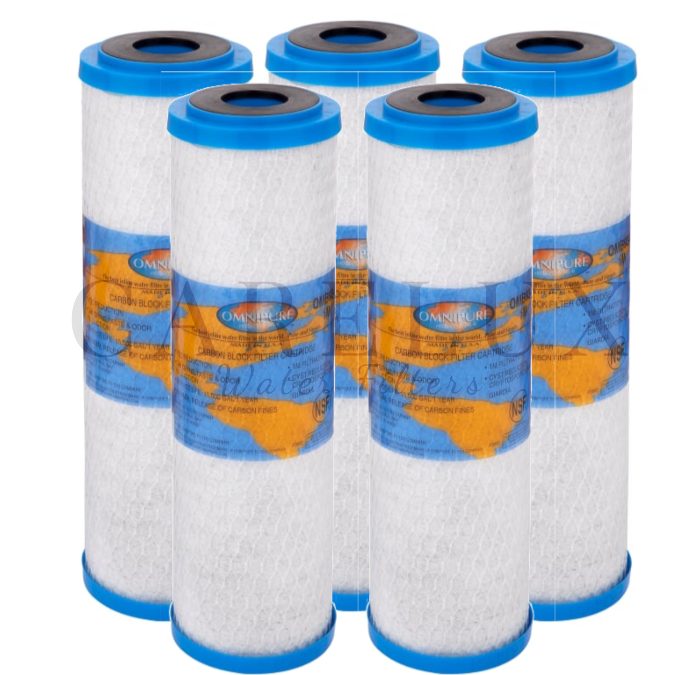Carbon Replacement Filter Cartridges
Carbon Filter Cartridges are primarily used to remove taste and odour from chlorine present in all water from a public water system. Some carbon cartridges reduce or remove lead that can be present in water.
- Some of our 0.4 Micron Carbon Filters can reduce Chlorine, Taste, and Odours.
- Some of our 0.5 Micron Carbon Filters can reduce Chlorine, Taste, Odours, and some cartridges Heavy Metals, Cysts, Hardness, Chloramines,.
- Some of our 1 Micron Carbon Filters can reduce Chlorine, Taste, Odours, and some cartridges Heavy Metals, Cysts, Hardness, Chloramines.
- Some of our 5 Micron Carbon Filters can reduce Chlorine, Taste, Odours.
- Some of our 10 Micron Carbon Filters can reduce Chlorine, Taste and Odours.
As you can see a smaller micron does not mean more pollutants being removed.
There are different types for filtration reverse osmosis, mechanical filtration, ion exchange, activated carbon, and more.
The micron rating indicates the pore size of the cartridge. However, the filtration media within the filter indicates the pollutants being removed.
Activated Carbon Block
Carbon Filters Filtration Capability
Microns are a size measurement of the pore size, so the smaller the number, the tighter the filter.
One-micron filters are for drinking water only.
In general, they are too tight to filter large amounts of water without slowing the flow to unacceptable levels.
Filter cartridge manufacturers also use the words “absolute” and “nominal” to describe their products’ micron ratings. Absolute means absolute.
Nominal means “more or less.”Carbon block cartridges are available in a variety of sizes and flow rates, and effectively provide good general-purpose drinking water filtration.
Additional Information
Most carbon water filters are efficient removing: chlorine, particles such as sediment, volatile organic compounds (VOCs), taste and odor.
However, there are other harmful pollutants that are encountered in the water.
For instance, Iron, Molybdenum, Lead, Vanadium, Nickel, Zinc, Cadmium, Copper, and Chromium are the most common heavy metals found in drinking water, and the best way to reduce significantly their levels in drinking water is through a reverse osmosis system.
It is also known that distillation and ion exchange methods are effective.
However, there are only two world wide known carbon cartridges, which remove these harmful contaminants.
Firstly, GEYSER Aragon Water Filters are highly efficient removing not only Chlorine and Chloramines like all carbon filters do, but removing Particles >2 microns, Lead, zinc, cadmium, cesium, Chlorine, Chloramines, Pesticides, Iron, Aluminium, Turbidity, Oil Products, and radio active elements.
Secondly, Omnipure Carbon Filters with LEAD removal properties, remove heavy metals as well, but their filtration capacity is not as high as the one in Aragon Filters.
Summary
There are different carbon filter cartridges available our there, most of them will remove chlorine, and other chemicals.
However, you can upgrade your carbon filters and get the best filter with the best filtration media.

